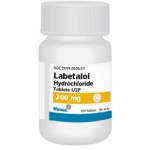- Type of Drug: Adrenergic blocker; antihypertensive.
- Prescribed for: High blood pressure.
Labetalol Hydrochloride General Information
Labetolol, first studied for its effect as a beta blocker, is a unique approach to high-blood-pressure treatment because it selectively blocks both alpha- and beta-adrenergic impulses. This combination of actions contributes to its ability to reduce your blood pressure. It may be better than other beta-blocking drugs because it rarely affects heart rate. Other drugs can increase or decrease heart rate.
Labetalol Hydrochloride Cautions and Warnings
People with asthma, severe heart failure, reduced heart rate, and heart block should not take Labetalol Hydrochloride. People with angina who take Labetalol for high blood pressure should have their dose reduced gradually over a 1- to 2-week period, instead of having it discontinued suddenly, to avoid possible aggravation of the angina. Labetalol should be used with caution if you have liver disease because your ability to eliminate the drug from your body may be impaired.
Labetalol Hydrochloride Possible Side Effects
Side effects with Labetolol develop early in the course of treatment and increase with larger doses.
- Most common: dizziness, tingling of the scalp, nausea, vomiting, upset stomach; taste distortion, fatigue, sweating, male impotence, urinary difficulty, diarrhea, bile-duct blockage, bronchial spasm, breathing difficulty, muscle weakness, cramps, dry eyes, blurred vision, rash, facial swelling, and hair loss.
- Less common: aggravation of lupus erythematosus (a disease of the body’s connective tissue), stuffy nose, depression, confusion, disorientation, loss of short-term memory, emotional instability, colitis, drug allergy (fever, sore throat, breathing difficulty), and reduction in the levels of white blood cells and blood platelets.
Labetalol Hydrochloride Drug Interactions
- Labetalol may prevent normal signs of low blood sugar from appearing and can also interfere with the action of oral antidiabetes drugs.
- The combination of Labetalol and a tricyclic antidepressant drug can cause tremor.
- This drug may interfere with the effectiveness of some antiasthma drugs, especially Ephedrine, Isoproterenol, and other beta stimulants.
- Cimetidine increases the amount of Labetalol absorbed into the bloodstream from oral tablets.
- Glutethimide decreases the amount of Labetalol in the blood by increasing the rate at which it is broken down by your liver.
- Labetalol may increase the blood-pressure-lowering effect of Nitroglycerin.
Food Interactions
This medicine may be taken with food if it upsets your stomach. In fact, food increases the amount of Labetalol absorbed into the blood.
Labetalol Hydrochloride Usual Dose
The usual starting dose is 100 mg taken twice per day. The dosage may be increased gradually to as much as 1200 mg twice per day, but the usual maintenance dose is in the range of 200 to 400 mg twice daily.
Overdosage
Labetalol overdose slows your heart rate and causes an excessive blood-pressure drop. The possible consequences of these effects can be treated only in a hospital emergency room. ALWAYS bring the medicine bottle with you.
Special Information
You may experience scalp tingling, especially when you first start taking Labetalol.
This medication is meant to be taken on a continuing basis. Do not stop it unless instructed to do so by your doctor.
Weakness; swelling of your ankles, feet, or legs; breathing difficulty; or other side effects should be reported to your doctor as soon as possible. Most side effects are not serious, but a small number of people (about 7 in 100) have to switch to another medicine because of drug side effects.
If you forget to take a dose of Labetalol, take it as soon as possible. However, if it is within 8 hours of your next dose, skip the forgotten dose and go back to your regular schedule. Do not take a double dose.
Labetalol Hydrochloride Special Populations
Pregnancy/Breast-feeding
This drug crosses into the fetal blood circulation. It has not been found to cause birth defects. However, pregnant women and those who might become pregnant should not take this drug without their doctor’s approval. When the drug is considered essential by your doctor, its possible benefits must be carefully weighed against its potential risks.
This drug passes into breast milk but has caused no problems among breast-fed infants; Nursing mothers who must take this medicine may want to bottle-feed their babies.
Seniors
Seniors may be more sensitive to the effects of this medicine. Your dosage of this drug must be adjusted to your individual needs by your doctor, especially if you have liver disease. Seniors may be more likely to suffer from cold hands and feet and reduced body temperature, chest pains, a general feeling of ill health, sudden difficulty in breathing, sweating, of changes in heartbeat because of this medicine.

